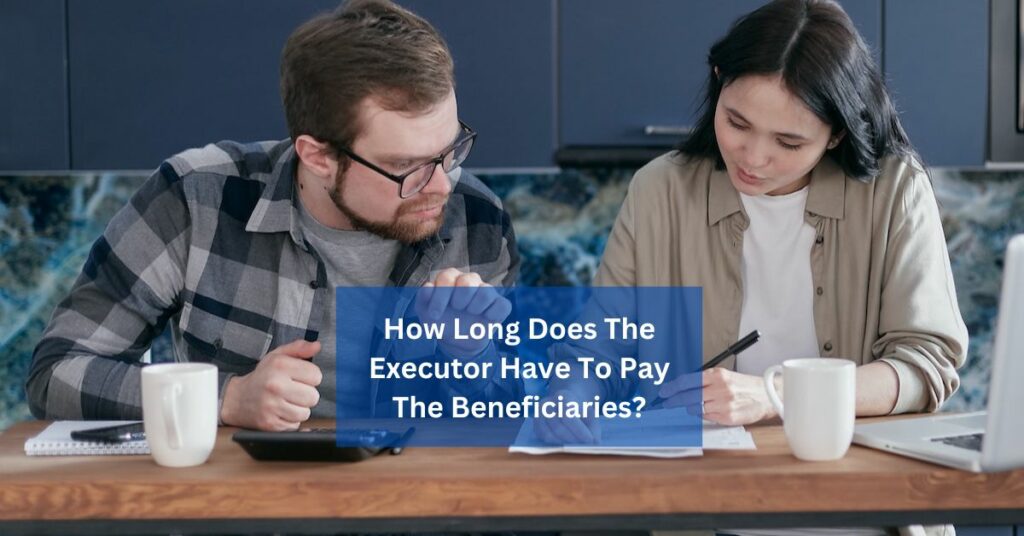How Long Does The Executor Have To Pay The Beneficiaries?

Losing a loved one is undoubtedly a challenging experience, and navigating the legal and administrative aspects that follow can add a layer of complexity to an already difficult time. Suppose you’ve recently found yourself named as a beneficiary in the will of a deceased family member or friend. In that case, you may wonder: “How long does the executor have to pay the beneficiaries?”
How long it takes for the executor to pay beneficiaries depends on a few things, like how complicated the estate is and the rules in the area. Usually, it takes about six to nine months for everything to be finished, but it can take longer if things are more complex.
As someone who has been designated to receive a share of the estate, it’s natural to seek clarity on when you can expect to receive your inheritance. Let’s explore this topic further to shed light on what you can anticipate during the estate administration process.
How Long Does The Executor Have To Pay The Beneficiaries?
When a loved one passes away, the distribution of their assets to beneficiaries is often a critical aspect of settling their affairs. The executor of the deceased’s estate plays a pivotal role in this process, tasked with managing the estate’s assets and ensuring they are distributed according to the terms of the will or applicable laws. One common question that arises in this context is: How long does the executor have to pay the beneficiaries?
Understanding the Executor’s Responsibilities:
Before delving into the timeline for paying beneficiaries, it’s essential to understand the responsibilities of the executor. An executor is typically named in the deceased’s will and is responsible for:
Probate Process: Initiating the probate process, which involves proving the validity of the will and administering the estate according to its terms.
Asset Management: Identifying, managing, and safeguarding the deceased’s assets during the probate process.
Debt Settlement: Paying off any outstanding debts and expenses of the estate, including funeral costs, taxes, and creditor claims.
Beneficiary Notification: Notify beneficiaries of their entitlements under the will and ensure they receive their rightful inheritance.
Asset Distribution: Distributing the remaining assets to beneficiaries according to the terms of the will or applicable laws if there is no will (intestacy).
When Can Beneficiaries Of A Will Expect To Be Paid? – Discover The Timeline For Inheritance Distribution!
The timeline for beneficiaries of a will to receive their inheritance can vary depending on several factors, including the complexity of the estate, the efficiency of the executor, and legal requirements. While there’s no set deadline for beneficiaries to be paid, understanding the typical stages of estate administration can provide insight into when distributions may occur.
Probate Process Timeline – Understand Estate Administration Better!
The probate process, which involves proving the validity of the will and administering the deceased’s estate, typically follows a general timeline:
Initiation of Probate: The probate process begins when the executor submits the will to the probate court for validation and is appointed as the estate’s legal representative.
Asset Inventory and Valuation: The executor identifies and gathers the deceased’s assets, which may include real estate, bank accounts, investments, personal belongings, and business interests. These assets are then appraised to determine their value.
Creditor Notification and Debt Settlement: Creditors and other interested parties are notified of the deceased’s passing, and any outstanding debts and expenses of the estate are settled using estate funds. This may include funeral expenses, taxes, outstanding bills, and creditor claims.
Beneficiary Notification and Distribution Planning: Once debts and expenses are settled, the executor notifies beneficiaries of their entitlement under the will and begins planning for asset distribution.
Asset Distribution: The executor distributes the remaining assets to beneficiaries according to the terms of the will or applicable laws if there is no will. This may involve transferring ownership of assets, liquidating assets to generate funds, or making cash distributions.
Factors Affecting Distribution Timeline :
Several factors can influence when beneficiaries can expect to be paid:
Estate Complexity: Larger estates with numerous assets, complex financial arrangements, or business interests may require more time to administer, delaying asset distribution.
Probate Laws: Each state has its own probate laws and procedures governing estate administration. Some states may have specific timelines or requirements for asset distribution, while others provide more flexibility to executors.
Creditor Claims and Disputes: Outstanding debts, creditor claims, or disputes among beneficiaries can prolong the probate process and delay asset distribution as these issues must be resolved before distributions can occur.
Executor Efficiency: The diligence and efficiency of the executor in managing the estate and fulfilling their responsibilities can impact the distribution timeline. Executors who promptly gather necessary documentation, communicate with beneficiaries and navigate the probate process efficiently may expedite asset distribution.
Average Timeline for Distribution
While there’s no standard deadline for beneficiaries to be paid, estates typically complete the probate process within six to nine months on average. However, this timeframe can vary widely depending on the factors mentioned above.
Communication and Transparency
Throughout the probate process, beneficiaries should maintain open communication with the executor to stay informed about the progress of estate administration and any developments regarding asset distribution. Executors are obligated to act in the best interests of beneficiaries and should provide regular updates and transparency regarding the estate’s status.
Tasks Before An Executor Can Pay Beneficiaries – Let’s Ensure A Smooth Transition Of Assets To Beneficiaries!
Before an executor can distribute assets to beneficiaries, several critical tasks must be completed as part of the estate administration process. These tasks ensure that the deceased’s affairs are settled properly and that assets are distributed according to the terms of the will or applicable laws. Here are the key tasks that an executor typically needs to undertake before paying beneficiaries:
1. Initiating Probate Process:
- The executor must file the deceased’s will with the probate court and petition for probate to validate the will and appoint the executor as the estate’s legal representative.
- If there is no will, the court will appoint an administrator to oversee the estate administration process.
2. Asset Inventory and Valuation:
- The executor is responsible for identifying and gathering all assets owned by the deceased, including real estate, bank accounts, investments, personal property, and business interests.
- Assets must be accurately appraised or valued to determine their fair market value as of the date of death.
3. Notification of Creditors and Debt Settlement:
- The executor must notify creditors, including lenders, service providers, and other interested parties, of the deceased’s passing.
- Creditors are given a specific period to submit claims against the estate for outstanding debts, including funeral expenses, taxes, medical bills, and other liabilities.
- The executor is responsible for settling valid creditor claims using estate funds before distributing assets to beneficiaries.
4. Filing Tax Returns:
- The executor must file the deceased’s final income tax return for the year of death and any outstanding tax returns for previous years.
- Estate tax returns (if applicable) may also need to be filed, depending on the size of the estate and applicable tax laws.
5. Resolving Disputes and Challenges:
- The executor must address any disputes or challenges regarding the validity of the will, beneficiary claims, or other contested matters.
- This may involve resolving disputes through negotiations, mediation, or, if necessary, litigation in probate court.
6. Finalizing Estate Accounts:
- The executor must maintain accurate records of all estate transactions, including income, expenses, distributions, and asset transfers.
- These records are used to prepare final accounting statements for the estate, detailing all financial transactions and distributions to beneficiaries.
7. Beneficiary Notification and Approval:
- Once debts, taxes, and other expenses have been settled, and the estate’s assets have been properly accounted for, the executor notifies beneficiaries of their entitlement under the will.
- Beneficiaries may be required to approve or sign off on the final accounting before distributions can occur.
8. Asset Distribution:
- After completing all necessary tasks and obtaining court approval if required, the executor can distribute the remaining assets to beneficiaries according to the terms of the will or applicable laws.
- This may involve transferring ownership of assets, making cash distributions, or executing other instructions outlined in the will.
FAQs – Common Queries About Executor Responsibilities!
1. Can the executor distribute assets to beneficiaries before the probate process is complete?
In some cases, executors may be able to make interim distributions to beneficiaries after settling debts and expenses of the estate, provided there are sufficient assets remaining to cover any outstanding obligations.
2. What happens if beneficiaries disagree with the executor’s decisions or actions?
Beneficiaries who disagree with the executor’s actions or decisions have the right to challenge them through the probate court. This may involve filing objections or seeking judicial intervention to resolve disputes.
3. Is the executor personally liable for any mistakes or mismanagement during the estate administration?
Executors are generally protected from personal liability as long as they act in good faith and in accordance with their fiduciary duties. However, if an executor breaches their duties or acts negligently, they could be held accountable and may be subject to legal action.
4. Can beneficiaries request an interim accounting of the estate’s assets and transactions?
Beneficiaries have the right to request an interim or final accounting of the estate’s assets and transactions from the executor. This provides transparency and accountability regarding the management of the estate.
Conclusion:
The timeline for an executor to pay beneficiaries can vary depending on several factors, including the complexity of the estate, probate laws, creditor claims, disputes, and the executor’s efficiency.
While there’s no standard deadline, executors are tasked with fulfilling their responsibilities diligently and ensuring assets are distributed to beneficiaries promptly, while adhering to legal requirements and protecting the interests of all parties involved.
Read:



